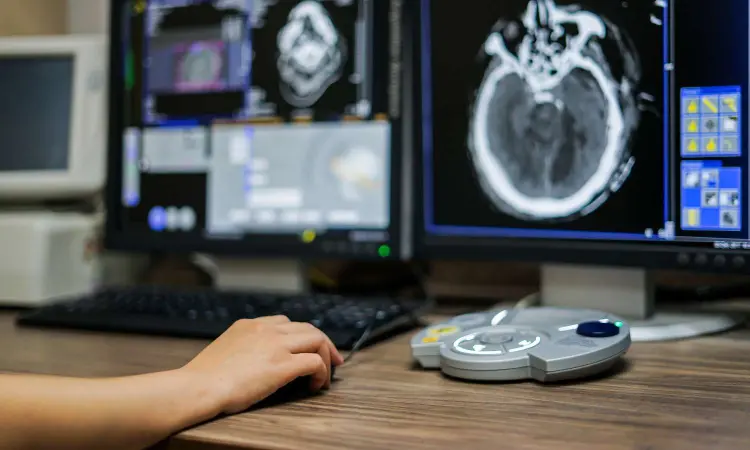- Home
- Medical news & Guidelines
- Anesthesiology
- Cardiology and CTVS
- Critical Care
- Dentistry
- Dermatology
- Diabetes and Endocrinology
- ENT
- Gastroenterology
- Medicine
- Nephrology
- Neurology
- Obstretics-Gynaecology
- Oncology
- Ophthalmology
- Orthopaedics
- Pediatrics-Neonatology
- Psychiatry
- Pulmonology
- Radiology
- Surgery
- Urology
- Laboratory Medicine
- Diet
- Nursing
- Paramedical
- Physiotherapy
- Health news
- Fact Check
- Bone Health Fact Check
- Brain Health Fact Check
- Cancer Related Fact Check
- Child Care Fact Check
- Dental and oral health fact check
- Diabetes and metabolic health fact check
- Diet and Nutrition Fact Check
- Eye and ENT Care Fact Check
- Fitness fact check
- Gut health fact check
- Heart health fact check
- Kidney health fact check
- Medical education fact check
- Men's health fact check
- Respiratory fact check
- Skin and hair care fact check
- Vaccine and Immunization fact check
- Women's health fact check
- AYUSH
- State News
- Andaman and Nicobar Islands
- Andhra Pradesh
- Arunachal Pradesh
- Assam
- Bihar
- Chandigarh
- Chattisgarh
- Dadra and Nagar Haveli
- Daman and Diu
- Delhi
- Goa
- Gujarat
- Haryana
- Himachal Pradesh
- Jammu & Kashmir
- Jharkhand
- Karnataka
- Kerala
- Ladakh
- Lakshadweep
- Madhya Pradesh
- Maharashtra
- Manipur
- Meghalaya
- Mizoram
- Nagaland
- Odisha
- Puducherry
- Punjab
- Rajasthan
- Sikkim
- Tamil Nadu
- Telangana
- Tripura
- Uttar Pradesh
- Uttrakhand
- West Bengal
- Medical Education
- Industry
Routine CT Scans Can Predict Cardiovascular Risk in GI Cancer Patients: Study

Researchers have identified that automated scoring of coronary artery calcium (CAC) with standard chest CT scans can predict cardiovascular risk among patients who have colorectal or gastric cancer. A recent study was conducted by Subin K. and fellow researchers published in the journal Circulation: Cardiovascular Quality and Outcomes. During the current study, patients with a CAC score greater than 400 had greater than twice the risk of future major cardiovascular events than those with a CAC score of 0, highlighting the potential use of CAC quantification as a prognostic tool in standard oncology practice.
Coronary artery calcium is an established marker for atherosclerotic cardiovascular disease and is widely applied to estimate risk in the general population. Its clinical usefulness in GI cancer patients has not been clearly delineated. Since chest CTs are often done to stage or follow GI cancer, using these scans to assess cardiovascular risk might provide a useful, non-invasive way to track CVD risk without adding additional testing.
This retrospective cohort study involved 3,153 patients with colorectal or gastric cancer who had undergone non-ECG-gated chest computed tomography in two large tertiary centers in South Korea between 2011 and 2019. Deep learning software was used to automatically derive the CAC score from the chest CT scans by researchers. According to these scores, patients were grouped into four categories: CAC=0, CAC 1–100, CAC 101–400, and CAC > 400. The major adverse cardiovascular event (MACE) was the primary outcome measured and defined as myocardial infarction, stroke, or cardiovascular death. Statistical analysis was by means of the multivariable Fine and Gray subdistribution hazard model, and a meta-analysis yielded pooled hazard ratios.
Key Findings
• The study sample consisted of 36.5% women and had a mean follow-up time of 4.1 years.
CAC distribution:
• 36.3% CAC=0
• 38.1% CAC 1–100
• 14.1% CAC 101–400
• 11.5% CAC >400
MACE incidence per 1,000 person-years:
• CAC=0: 5.28
• CAC 1–100: 8.03
• CAC 101–400: 9.99
• CAC >400: 29.14
In comparison to the CAC=0 group:
• CAC 1–100: Hazard Ratio (HR) 1.43 [95% CI: 0.41–5.01]
• CAC 101–400: HR 0.99 [95% CI: 0.48–2.04]
• CAC >400: HR 2.33 [95% CI: 1.24–4.39]
The research concluded that colorectal or gastric cancer patients with CAC scores greater than 400 on standard chest CT scans were at a significantly increased risk for major cardiovascular events. Adding automated CAC scoring to routine imaging protocols could offer a non-invasive, low-cost way to improve cardiovascular risk stratification and possibly improve overall prognosis in cancer patients.
Reference:
Kim S, Kim S, Cha MJ, Kim HS, Kim HS, Hyung WJ, Cho I, You SC. Association Between Automated Coronary Artery Calcium From Routine Chest Computed Tomography Scans and Cardiovascular Risk in Patients With Colorectal or Gastric Cancer. Circ Cardiovasc Qual Outcomes. 2025 Jun 16:e011656. doi: 10.1161/CIRCOUTCOMES.124.011656. Epub ahead of print. PMID: 40519001.
Dr Prem Aggarwal, (MD Medicine, DNB Medicine, DNB Cardiology) is a Cardiologist by profession and also the Co-founder and Chairman of Medical Dialogues. He focuses on news and perspectives about cardiology, and medicine related developments at Medical Dialogues. He can be reached out at drprem@medicaldialogues.in


